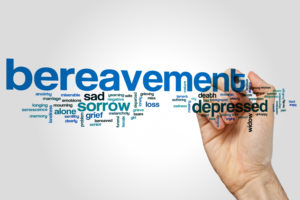Bereavement/Grief

Grief is intense emotional suffering caused by a loss. You may hurt in a deep, physical way that can be felt all over your body. Grief can feel scary and can lead to shutting down emotionally to avoid the negative emotions. If unresolved, anxiety symptoms, depression or compulsive behaviors may surface. It is healthy and natural to mourn what we have loss. The natural stages of grief are denial, anger, bargaining, depression and acceptance. In the face of the pain, hurt, and deep disappointment is the wall of protection known as Denial. This denial shifts to Anger that may be viewed as reasonable or unreasonable. You are more likely to blame others during this stage. You may become distrustful, want revenge, or get even. Once the anger begins to lessen, you shift to Bargaining with life, yourself, others, or The almighty. Depression seeps in when bargaining has not worked and the struggle to ward off reality has failed. At this stage, the full force of the loss is experienced and is accompanied by crying and intense emotional pain.
Are you experiencing some of these feelings?
- Shock- the initial reaction of being stunned or numb
- Disbelief- feeling that the death is surreal or did not happen
- Helplessness- difficulty in performing activities of daily living
- Hopelessness- feeling that life is not worth living
- Forgetfulness- unable to complete a talk, absentmindedness
- Fearfulness- you are going “crazy” or that someone else will die
- Restlessness- inability to sit still/concentrate or maintain focus
- Anger- that the death has occurred or that the person has left them
- Guilt- over what was left unsaid or undone in the relationship
- Emptiness- felt physically in the chest/stomach or other physical symptoms
- Pain- the experience of bodily pain
- Tearfulness- burst of emotions at unexpected times
- Yearning or longing- aching for one more touch
- Depression- experience sleep/appetite changes/low energy/sad mood, etc.
- Anxiety- feeling pressured to get control of emotions and be “normal” again
The last stage of bereavement is Acceptance. This is not necessarily a happy stage. It may be void of feeling. There may be peace, but not that healing is complete or the empty feeling is gone. Perhaps, eventually, the grieving process evolves into an acceptance that serves as memories cherished rather than chaos and avoidance.
Are you or someone in your life going through the grief process of a major loss? What stage do you think you/they are in? Psychotherapy can help with grief and loss. You can learn more about the process and express your feelings openly. Your therapist will be an objective supporter that will be encouraging during your grief. You don’t have to grieve alone. Your therapist can help you through the complicated emotions.
